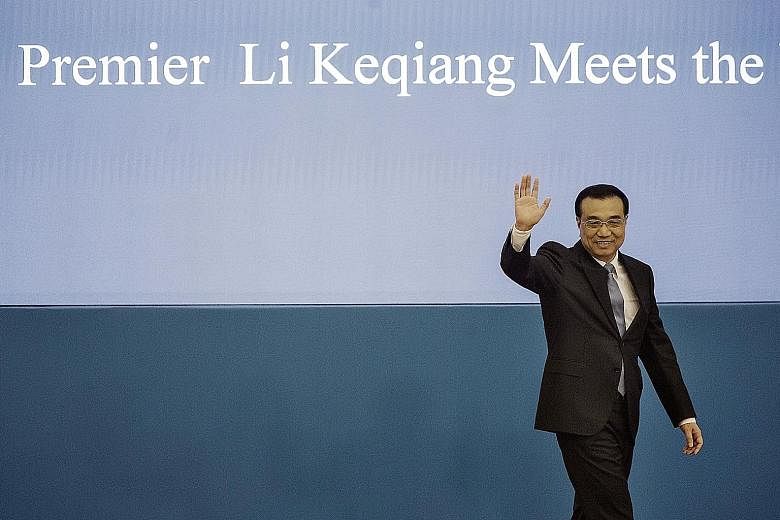Chinese Premier Li Keqiang has expressed optimism over Sino-US relations as the two countries' leaders prepare to meet, but he warned against a trade war that would hurt both sides.
"We feel optimistic about the future of China-US relations because after several decades of growth, China and the United States now share extensive common interests," Mr Li said yesterday.
He was speaking at a press conference after the close of the annual session of the National People's Congress, China's Parliament, fielding a wide range of questions from domestic issues to foreign affairs.
While it was true that China and the US had differences, "it is important for both countries to uphold strategic interests (and) sit down to talk to each other so as to enhance mutual understanding and trust", he said.
He noted that discussion was under way for Chinese President Xi Jinping to meet US President Donald Trump.
Some US media have reported that a summit between the two leaders will take place early next month at Mr Trump's oceanfront resort Mar-a-Largo in Florida.
Mr Li also pointed out that Washington's adherence to its "One China" policy was the political foundation of bilateral ties that could not be undermined.
After winning the election, Mr Trump spoke on the phone with Taiwan President Tsai Ing-wen and questioned the "One China" policy under which the US acknowledged China's position that the mainland and Taiwan belonged to one China.
Mr Li yesterday noted that Mr Trump and senior officials of his administration have stated that they would adhere to the policy.
-
Highlights of annual Parliament session
-
STEP CLOSER TO A CIVIL CODE
The National People's Congress yesterday passed provisions of a civil code, moving China closer to a law that protects the civil rights of its 1.38 billion citizens. The code will also spell out the social responsibilities of the people.
POVERTY ALLEVIATION
With a 2020 deadline for becoming moderately prosperous, this year's goal is to lift 10 million people out of poverty.
SMOG AND OTHER POLLUTION
Besides making China's skies blue again, officials are also tackling soil pollution, a sensitive issue linked to farmers' livelihoods, and food safety.
JOB CREATION
Keeping unemployment low is crucial to stability and this year's 6.5 per cent growth target is aimed at creating 11 million jobs.
REFORMS
Deepening of reforms, particularly those to tackle overcapacity and develop new drivers of growth, was much discussed.
Goh Sui Noi
On the possibility of a trade war between China and the US, Mr Li said: "We don't want to see any trade war breaking out between the two countries. That won't make our trade fairer and both sides will be hurt."
During the election campaign, Mr Trump accused China of stealing US jobs, and threatened to slap heavy tariffs on Chinese goods and declare China a currency manipulator. This has led to speculation of a trade war between the world's two largest economies.
Mr Li said figures showed trade and mutual investments created up to one million jobs in the US and, citing a think-tank study, warned that if a trade war should break out, foreign firms, particularly US ones, would bear the brunt of it.
On the escalating tensions in North-east Asia over North Korea's nuclear programme and missile tests, Mr Li urged dialogue to reduce tensions.
He also addressed fears of South-east Asian countries over US-China rivalry in the region and whether they would be forced to take sides.
"China does not want to see any party feeling compelled to choose sides under the influence of a Cold War mentality," he said, adding that China hoped to see an Asia-Pacific region that was stable and orderly.
On the South China Sea disputes, he noted that China and Asean had achieved "substantive progress" on a legally binding code of conduct. He said specific disputes should be resolved through direct talks between concerned parties.
China has overlapping territorial claims with four Asean states, the Philippines, Vietnam, Malaysia and Brunei. It has been more assertive in its claims, building artificial islands on reefs it occupies and placing military facilities on them.
The US has criticised Chinese militarisation of the resource-rich waters and challenged what it perceives as excessive Chinese maritime claims through freedom of navigation operations.
Mr Li yesterday said China and the US could broaden their areas of cooperation in the region, thereby affording opportunities to Asean countries, instead of letting these countries feel that Sino-US relations "are a source of trouble".

